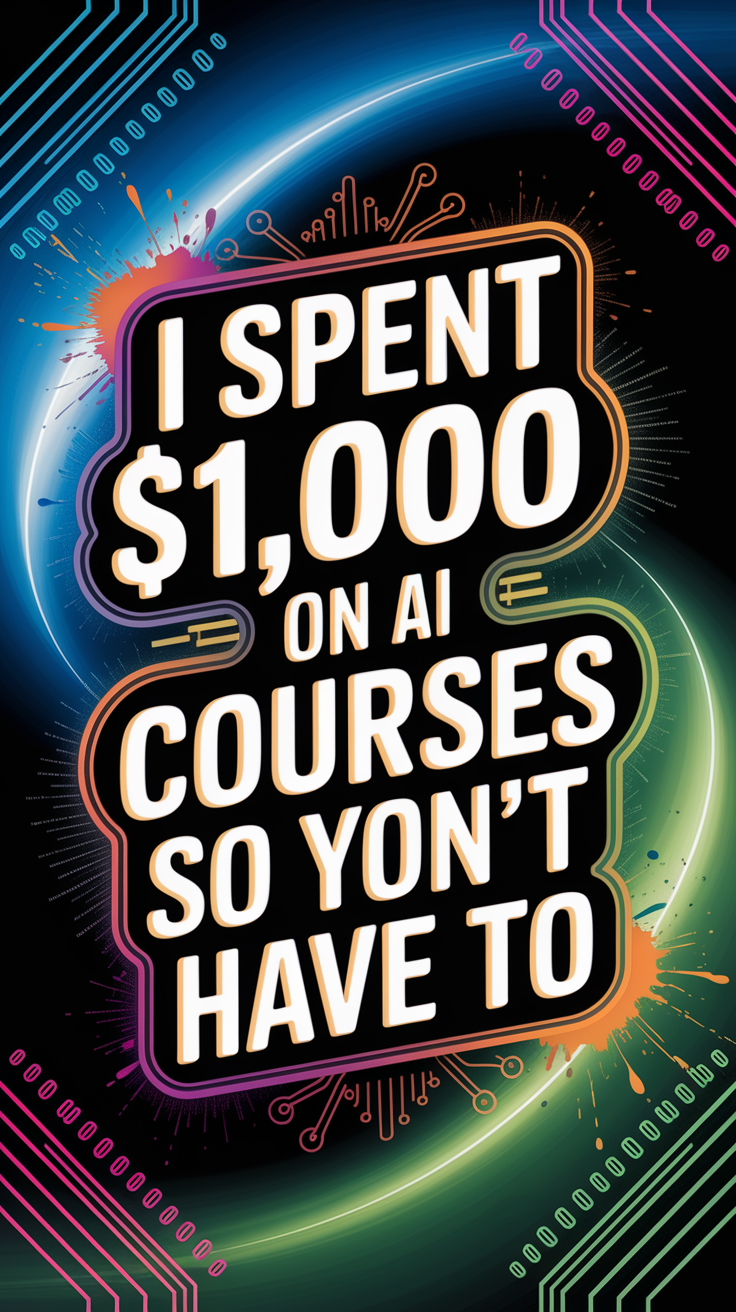Alright, Okay: 7 Reasons I Dipped My Toes into the $1,000 AI Course Waters (And Why You Might Too)
Let's be real. This isn't just about *learning* AI anymore. It's about understanding it, feeling it, maybe even *doing* it a little bit. I'm Pierre, married, got kids grown now, heading down a tech path influenced by a family who understands the power of crafty fingers and critical thinking. A $1,000 splurge? That got my antennae twitching. Wait... $1,000 for what? Robot dancing? Let's see what's *actually* valuable out there.
Over the past year, as Artificial Intelligence started dominating headlines and finally began offering practical applications (beyond just dreaming about cleaner carpets or smarter refrigerators), I found myself standing at a fork in the information highway. My gut said: "Something's here, major something." My bank account whispered: "Something else is happening."
Through a combination of sheer curiosity, a nagging suspicion that AI wasn't just bluster, and a secret dream of making a dent in a meaningful problem (not just commenting on memes about AI rewriting Dostoevsky), I committed. But instead of jumping into any shiny course on Day One – and especially not one dangling a $1,000 bill as bait – I got methodical. This wasn't shopping till you drop; it was audit-first-audit-second, whiteboard scribbling, friend-borrowing-advice, and ultimately, the cohabitation of a significant chunk of change with my existing tech education budget.
Why did I do it? Because at $1,000+ for an introductory sequence covering everything from fundamental concepts to practical application, it felt less like a frivolous tech purchase and more like a strategic investment in a future where understanding Artificial Intelligence wasn't optional, it was like being colorblind in a world obsessed with gradients.
Course Binge Bonanza: A $1,000 Detour Through the AI Labyrinth
Think of this first section as the 'build-up' – justifying the domain. AI courses aren't your typical Saturday class; they form a complex ecosystem. I explored primarily online platforms, as that aligns with the *zeitgeist* of learning and accessibility.
You Might Wanna Try These Gimmicks First (before handing over that $1000):
* **The Freebie Frontier:** Much of the introductory AI magic is *available for free*. Platforms like [Coursera](https://www.coursera.org), especially Stanford's Deep Learning Specialization (which Andrew Ng himself helps guide), offer solid foundation stuff mostly gratis. Then there are channels like [YouTube](https://www.youtube.com) gems like Siraj Raval's chaotic, hype-o-meter-high but often incredibly intuitive videos. And who else? [Kaggle](https://www.kaggle.com) is less traditional, more like a coding playground for AI experiments, full of datasets and competitions to flex your muscles. Strategy: Absorb everything free. Literally. Get yourself set up with tools like Python Anaconda, a decent laptop (maybe you'd spare your old one on [Amazon.ca](https://amzn.to/3Z4o9Jg)?), learn the foundational Python programming scratches – it’s the AI dance floor’s currency. You won't waste time like a fresh AI dabbler if you do this homework first.
* **Semi-Structuring Your Deep Dives (~$50-$100):** Don't be deterred because some cool courses cost money. The middle tier isn't all digital snake oil. Look for shorter courses, focused on specific tools like [TensorFlow](https://www.tensorflow.org)(its official learning path) or [scikit-learn](https://scikit-learn.org/stable/index.html), maybe some Udemy gems (who offers tons of discounts often). Examples might pop off [LinkedIn Learning](https://www.linkedin.com/learning) too. I dipped toes into a few, analyzing their structure, homework quality, instructor vibe, pace – all vital stuff if you're not doling out major cash *yet*. Use them to taste the water before deciding if the $1,000 river *and* swimming hole are really worth the commitment.
Now Bringing Out The $$$$ Big Dogs (The $1,000 Kind):
* **Comprehensive Tracks, From fundamentals to Fancy Stuff (~$700-$1000+):** Ah, the big leagues. I didn't shell out $1,000 on *just* one course, not necessarily. Think sequences like DeepLearning.AI Professional Certificate specialization on [Coursera](https://www.coursera.org), often bundled or requiring multiple courses. These aren't kid's snacks; they're multi-meal deals designed to actually bedrock your understanding. Expect weeks dedicated to Neural Networks, specific hands-on projects in cloud environments (hello [Amazon Web Services](https://aws.amazon.com/machine-learning/) or [Google Cloud Platform AI](https://cloud.google.com/ai-platform) stuff), maybe touching on reinforcement learning or specialized topic classes. It often includes graded assessments, discussion prompts, and specializations (like Deep Learning, Natural Language Processing, Computer Vision). Think taking a whole intensive bootcamp format *online*, maybe involving a decent chunk of actual hands-on cloud time (which centers around $90 for a month's [AWS Free Tier](https://aws.amazon.com/free/?p=c_Deep_Runs&page=1's).)
* **Why Pay Up "$1,000"? A Few Good Guesses:** Okay, so $1,000 – or whatever the exact final number ended up being – isn't pocket change for a basic intro. What's up with that? Well:
* **Longevity & Relevance:** AI is one of those things that updates on the speed of hypersonic joke time. A really good, in-depth program ensures you're learning concepts and *practicables* built on rock-solid foundations relevant for what's emerging or likely to still be relevant in a few months or years. Free stuff gets replaced overnight.
* **The 'Official' Taste Test:** Some programs provide structure opponents of the flakes miss. Homework, projects, discussions – these build habits crucial for you even if you're not charged admission. Someone who truly grasps it often pushes you a bit, and giving up $1,000 ensures you're getting that "paid" upside. If a course has too much hazing, can you honestly *trust* it?
* **Cloud Access & Usage:** These $1,000+ paths are rarely just about theory. They get your hands dirty with code execution *on their platforms*, often built on [Google Colab](https://research.google.com/colab/) or offering access that wouldn't normally be offered for free (like an actual TPUs). While you'd use free Colab, these paths might structure that usage well, maybe even requiring you to use their links or plans you *pay* for sometimes. Plus, exposure to these big frameworks (GCP, [Azure Machine Learning](https://azure.microsoft.com/en-us/services/machine-learning/), AWS ML) is gold.
* **Perceived Value:** Nailed it. When you pay $, you typically strongly expect superior quality. $1,000 gets you a serious package, not a slightly-discounted, half-hearted starter pack.
* **Stepping Stones, Not End Points:** Frankly, a $1,000 course isn't your launchpad into AI and done. Done, being funny. You've bought the RPG character sheet, you're now battle-tested on tutorials. Next up: projects, building your awesome portfolio piece using data sets you source yourself, joining online communities like [Kaggle](https://www.kaggle.com) or subreddit r/MachineLearning for banter and practice, playing with data sets you find – maybe even doing some side hustle work if your skills are sharp enough. That $1,000 gets you here, not there. And that realization fuels ongoing learning – a beautiful tech addiction that never truly fades.
But Wait! Is That $1,000 Actually an Investment, or Just a Gimmick?
Acknowledge your skepticism, oh reader, naysayer if you must be. Here's the nitty-gritty analysis, because figuring out if it's money down the AI drain vs. planting a seed for future returns is absolutely crucial. Don't just learn, learn *wisely*. Here's breaking it down:
The Great Payoff Debate
Committing a $1,000 budget versus choosing from a buffet of cheaper, even free, options requires weighing pros and cons directly.
The Case For Paying Up:
* **Accelerated Learning & Structured Journeys:** *This isn't a video game where you can just grind indefinitely on the cheap.* These specialized tracks provide guided pathways through complex topics, saving yourself the time and frustration of clueless experimentation. Especially work on Deep Learning or foundational AI, structured learning is often the fast and relatively easy path compared to DIYing everything.
* **Certified Credibility:** *Maybe this isn't the warm fuzzy feeling of a diploma and hat ceremony*, but in many circles, these official certs are starting points for professionals needing to confidently demonstrate they're tackling age-of-smart stuff. Some job boards and internal career ladders do nudge toward this big-ticket stuff.
* **Networking Potential (Stealthy) Benefits:** While the course creators might not design it this way directly, joining paid tiers or working through them often mixes you with dedicated learners. On LinkedIn or other tech forums, members might measure up, making shrewd mentors or "connections" workables down the road.
* **Holistic View:**Major packages like Coursera's Deep Learning Cert often guide you through theoretical underpinnings, hands-on labs, and specific application knowledge. It gives a scope beyond siloed subjects, painting a fuller picture than cheaper grabs, which might be fractured or just introductory fluff without structure.
Course Swamp Avoidance Warnings (The Risks of the Cheapie Sludge):
* **The Cheaper Courses Swamp:** Not *all* dollar-draining courses are bad news bagpipes sounding off wild promises. But nearly all $100-$200 bootcamps online live in scary fog: unclear curricula, thin credibility, maybe expensive "community" add-ons you don't actually need. This path often misses the fundamentals. Worse, wild price what-matters-is-speed high-intensity outfits usually rely way more on rote memorization than honest understanding. Be careful. A lot of what passes for low-cost AI advice online is actual snake oil.
The Pragmatism Playbook: Free Learning, Subscriptions, Or Wait For Better Deals?
Ironically, learning the flow of AI (let's bend over backward) isn't always about the end goal; it's often about how you get there without going broke.
Your $1,000 could hide some potent lessons you'd learn otherwise.
$1k Beast Mode vs. Frugal-Forward Trips
If you want any fairness, $1000+$ course paths are pretty unfair contenders. But let's be real – for many, the value isn't always there. It often leans toward bulk quantity leaning but sometimes doesn't hit the right quality nuances necessary for ongoing value.
So let's approach that $1,000 more strategically. Maybe it's not one big platter, but several components chosen wisely, sometimes with full refunds if something doesn't click.
Approach #1: Free Fun Zone Reloaded (Seriously, Start Here)
Seriously, expand your free options before spending a cent beyond maybe grabbing one decent online book release from [Amazon.ca](https://amzn.to/3Z4o9Jg) that isn't sensationalized clickbait/whiners.
* **Python Mastery Basics:** Start if you've even skimmed Python. Head over to [Codecademy's free intro to Python](https://www.codecademy.com/learn/learn-python-3). Getting able to program at least a little is your AI entry pass. Or get yourself adapted with free PDFs like *"Python Crash Course"* which pops off [Amazon](https://amzn.to/3Z4o9Jg). Control your digital world. This skills probably rank higher than AI fantasy wizardry if you're from [Ottawa](https://inthacity.com/headlines/canada/ottawa-news.php) or [Toronto](https://inthacity.com/headlines/canada/toronto-news.php) neighbourhoods, sure.
* **AI Foundation Staples:** Frame the free world again. Union College's "Machine Learning" course on [Coursera](https://www.coursera.org)'s learning marketplace? It's actually *free*, by the way. Takes you far. There's also Stanford DeepLearning Specialization and some pathfinders on [Udacity](https://www.udacity.com). You can also hop online and practice with AI models free using [ChatGPT](https://chat.openai.com) (the open version) or [Hugging Face](https://huggingface.co) model hub – there's always options free. Experiments are legal fun, technically.
Approach #2: Subscription Stations & Community Hangouts (Lower Total Commitment)
Stream way more value for less money, often. This works two ways: pay monthly to mix-up sources, or donate/become a member for access or extra content. You're spreading costs out and getting more feel.
* **Learner Hubs:** [LinkedIn](https://www.linkedin.com/learning) brings useful personalized material suggestions, courses covering specific AI subfields, and community resources. Their annual pub/sub membership is about $25/month. Might be one of the best of thefew flat-rate access points. Or there's [Udemy Pro](https://www.udemy.com/pro) with subscriptions, which also zeros in on flexible discounts on AI deals (often big tick-up discounts). They pack much more bang for the long-term BA gun than a one-off huge hit.
* **Community Gatherings/Cloud Labs:** Subscription-based online platforms offering specific AI kernel access are additional ways. Some cloud services offer [low-cost monthly subscriptions](https://cloud.google.com/docs/use/use-case/codesample/m/ai-codelab-tutorial/google-cloud-startup-pricing-for-ml) for more intensive trials, especially with GCP or Amazon Web Services (AWS). These are useful once you have a base-level grasp.
Approach #3: Delay Isn't Apathy (Waiting For Discounts/Mechanics)
Learning happens over time, and good stuff drops off constantly. That $1,000 $600-$700-$800 courses usually offer between 3-6 months of active participant services; others have yearly bundles if you're a serious squirrel for this stuff.
Patience is your superpower. Wait for seasonal sales or outright coupons offered by course provides. Check out the [Harvard Extension School stuff](https://www.extension.harvard.edu/online-learning) for example, or look at paths from big universities sometimes offered via Coursera at reduced price for long time learners with multiple enrollments. Price comparisons matter a lot here. You'd even just grab a course path knowing full well a bigger plan will drop in price soon if you noodle around for a few months; that builds strategy.
Finally, understand *why* you're seeking AI knowledge. If it's self-improvement or hobby, the free resources might be plenty. If it's career change or business AI integration, some paid pathways more rigorous or structured might be the leverage you need to differentiate your skills and your value. That $1,000 justification ties back to the question: are you ready to make this a credible, long-term move or just an expensive flash-in-the-pan?
Level Up Your Brain: Turn AI Know-How into Real Work or Hobbies
So, thinking about going beyond the course structure to actually do *something* with your AI education? Aiming to make projects happen that aren't just homework? Awesome! The courses you take are your springboard. Here's how to turn those algorithm-ic ideas into execution.
Beyond the Course Walls
The real learning comes after you watch the lectures and finish the assignments. That's where you sharpen your own mettle.
Journal your learnings. Write down what aspects resonate, which examples felt useful, what approaches didn't land well (critical thinking time). That thinking becomes your unique style and gives you a leg up as you work on projects.
Project Time! Your AI Showcase
Think of this as your portfolio piece for the AI world. What can you *actually do* after absorbing the course content?
* **Data Dives:** Identify your weaknesses? Pick some online, freely available data sets on things that speak to you (maybe local things near [Calgary](https://inthacity.com/headlines/canada/calgary-news.php), like maybe environmental data off Environment Canada, or older finance data from company reports) and practice wrangling them clean, using tools like [Pandas](https://pandas.pydata.org). Aim for data analysis using [Matplotlib](https://matplotlib.org) or [Seaborn](https://seaborn.pydata.org) that tells a story.
* **AI Model Toy Runs:** Use free or low-cost model hubs like Hugging Face to mess around. Try classification, maybe build a chatbot for answering local [Charlottetown](https://inthacity.com/headlines/canada/charlottetown-news.php) tourist questions, image recognition for classifying Saskatoon street art, or maybe something niche. Kaggle is also great for competition-style projects tied to actual data quests.
* **Tweak and Tweak:** Replicate small elements pushed in the course, then try changing parameters, inputs, or outputs. Play gremlin.
* **Balance the Scales:** Aim for a good mix of tutorials you built yourself or adapted. Teamwork might take shape on GitHub too.
Putting together a collection of these gives you tangible evidence of your skills. That's your entry ticket to discussions happening on topics ranging from [Toronto's startup scene](https://inthacity.com/headlines/canada/toronto-news.php) to [Vancouver's innovation districts](https://inthacity.com/headlines/canada/vancouver-news.php), not to mention Corporate Canada. It provides the ammunition you need to elaborate on how AI could potentially fix a broken process, why learning it is such a good strategy, and maybe even what makes ethical AI tricky.
"Eat the Elephant" One Bite at a Time: Focus Your Efforts
This field is massive, but depth beats breadth any day. Identify your niche, dear reader.
Is serious [NLP](https://towardsai.net/nlp-for-beginners-a-comprehensive-guide) fascinating? Then eat that elephant one NLP rabbit hole at a time. Maybe try using free tools like spaCy or NLTK. Create a setup that cleans and tags text about Montreal literary news for example.
Computer Vision capture you? Awesome. Tinker with image classification using [TensorFlow Hub](https://tfhub.dev) assets. Go wild with image recognition of Gatineau parks.
Maybe business applications like forecasting sales (like maybe predicting Christmas toy sales in Seattle-area stores) or predictive maintenance in logistics grab you more. Check out how well libraries like [Statsmodels](https://www.statsmodels.org/stable/index.html) or time-series models do everything enterprise.
Pick your AI corner and drill down. Having focus allows you to move from learner to someone who understands AI from strategic or implementational angles, even if you're still a relative newcomer overall.
Hold On To Your Hats: Thinking Like an AI Pro Right Now
Even after investing $1000 in a course or spending less in your chosen method, the journey doesn't stop. AI changes *very fast*. You need the right thought patterns.
* **Problem-Focused, Not Just Tech-Focused:**never forget the "apples falling out of trees" syndrome. Why are we using this advanced neural structure? To forecast sales, diagnose illness, spot spam? Focus consciously on the *why* behind the tech. Increasingly, the best analytical minds in the world tie AI directly to the human needs or business goals. Think: *How does this help Mom & Pop solve their inventory problems, or our city planning next year, or finding that hidden bug in legacy code?* Storytelling data schtick! This is the magician who just knows his stuff.
* **Embrace the Toolkit Mindset:** AI isn't just *neural networks*. It's a broad toolbox including data munging (like cleaning data scraped from Halifax city websites maybe), visualization (using Matplotlib or Seaborn to tell a data story), classical ML algorithms (Decision Trees, Support Vector Machines – maybe helped learning from YouTube guides) like recommendations, before scaling to big bad deep learning. Getting competent in a few key tools is better than being mediocre on many sheets.
* **Actually Learn From Mistakes:** Your first supervised learning project likely won't shine. Yes, really! It's vital to accept making errors. *Don't fear failure, embrace it.* Having a failed project or model means you can learn *from* it, debugging code, adjusting assumptions, understanding why certain things break. Okay, fail fast, but definitely, analyze.
* **Detail Matters, Seriously:** Big AI models reflect years of careful design. Pay attention to numbers, bit shifts in the data, how exactly you scale features (often vital for accuracy). Small tweaks in data representation or process steps change everything. Good notation and exactness are second nature for pros.
Weaving AI into Reality: Where Will You Use These $1,000+Bought Skills?
So, we talked integrating your learning, focusing your talents—now, where does all this point, practically? Let's get realistic. Possibilities dazzle, but daily life often involves concrete applications, not just fancy filters.
The Knowledge is Power Playfield
That $1,000 investment, whether paid via a mega-program path or accumulated via more frugal means, should get you an AI smarts toolkit. It won't make you a lead GPT engineer overnight, maybe not even close, but it will fundamentally change how you *approach* complex problems, understand data, and integrate tech.
Career Crossroads: AI Adaptation
Jobs aren't melting unless you're writing the new open source AI for starship navigation – not really, at least not yet significant. That's the billion-dollar startup/tabloid rumor thing. What happens more often is that AI integration raises the floor for existing roles. Marketing people become wizards with predictive campaigns. Business analysts use [machine learning models](https://builtin.com/data-science/machine-learning-for-business#:~:text=A%20machine%20learning%20model%20is,for%20fraud%20detection%2C%20recommendation%20systems etc.) to provide near-time analysis. Programmers get asked to integrate AI libraries or debug them. You know [Fredericton's tech sector](https://inthacity.com/headlines/canada/fredericton-news.php)? Its future is everyone's armed with AI skills. Having the intelligence to see how your existing skills combine with AI offers competitive advantage during job searches, promotions, or salary talks at any job, tech or otherwise. Even if you're a teacher in [Regina](https://inthacity.com/headlines/canada/regina-news.php), wrapping AI conceptualization around your lessons might help hook student interest.
Franchise Your Skills: The "Do It Yourself" AI Advantage
This isn't just "here's the knowledge, go forth and add vectors." It's about crafting what? Real, practical value.
* **Jam Bands:** Tinker with your own data sets or create innovative websites, scripts, maybe even simple AI chatbots for your own online projects. Parents need help getting their law firm sites better? Guess what, AI can help write content highlighting their social impact – maybe even automating small research tasks. School boards looking to predict student support needs? AI modeling could chime in.
* **Analytical Freelance:** If you like the digging, offer data cleaning, exploratory data analysis, simple predictive modeling services. Great side gig, especially if you connect with small-to-medium businesses. Maybe help [Saskatoon-based agribusinesses](https://inthacity.com/headlines/canada/saskatoon-news.php) see market trends better?
* **Smarter Community Citizenry:** Use AI understanding to navigate local [Toronto discussions](https://inthacity.com/headlines/canada/toronto-news.php). Analyze local hashtag trends on Twitter to see what concerns really grip? Help a local arts collective understand their audience reach better? Understanding AI arms you to influence local projects intelligently, even if you don't wear a corporate tunic.
Conclusion: The $1,000 AI Investment – What Now?
A $1,000 journey into AI courses raises a mirror back to you and how urgently you grasp the coming changes. Was it wasted? Not if you built a solid foundation and use that knowledge wisely. It transformed beyond the course pages, giving you a force multiplier for your analytical skills and opening doors you didn't know were there.
So, what? Will that $1,000 let you contribute meaningfully? Adjust community decisions based on data trends? Identify business efficiencies? Maybe you'd even chat up AI ethical debates at our next [Montreal](https://inthacity.com/headlines/canada/montreal-news.php) Digital Summit?
The sheer potential ripples on the vast, global city of the Web. We all stand connected, nodes in this learning network.
Before you navigate off, I gotta ask you: **What application, project, or even simple "aha!" moment connected directly to AI learning feels NEXT FOR YOU? What would a $1,000+ investment achieve if you made that leap, or an equivalent of it in a smarter structuring way already planned?**
Also, consider connecting with our *Intellectual Power Plant At The Web Level* at **iNthacity.com**. Dive into our stuff about local city portals – Calgary [City Portal](https://inthacity.com/headlines/canada/calgary-news.php) info, maybe? Or [Charlottetown avenues to tech education](https://inthacity.com/headlines/canada/charlottetown-news.php). Expand that worldview. We're always looking for more bright sparks to tag along and make the shifts that help us understand ourselves better. Join the ** "Shining City on the Web" discourse. Share your thoughts below – let's start that conversation.
And remember, the best time to see if you're suited for AI adventurousness was sometime in your freshman year. The best time to start learning serious AI stuff intelligently? **Right now.**



Disclaimer: This article may contain affiliate links. If you click on these links and make a purchase, we may receive a commission at no additional cost to you. Our recommendations and reviews are always independent and objective, aiming to provide you with the best information and resources.
Get Exclusive Stories, Photos, Art & Offers - Subscribe Today!
























Post Comment
You must be logged in to post a comment.